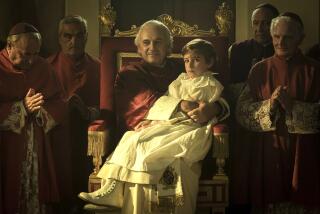MOVIE REVIEW : ‘Bambini’: A Spare But Moving Tale
- Share via
“Il Ladro di Bambini” translates as “Stolen Children,” but what is really stolen in this spare, faultless and almost magisterially melancholy Italian film is childhood itself. Eleven-year-old Rosetta and her younger brother Luciano are sullen, mistrustful and withdrawn, and it is the business of writer-director Gianni Amelio to quietly reveal not only what went wrong but also what if anything can finally be done about it.
In even its title, which echoes Vittorio De Sica’s landmark 1949 “Ladri di Biciclette” (“The Bicycle Thief”), this film is a return to the classic simplicity of Italian neo-realism, a style of filmmaking that emphasized real-world settings, non-professional actors, documentary-style cinematography and a strong social conscience. But what is impressive about “Bambini” is not just its roots but how effectively Amelio has updated the style and made it forceful, relevant and moving.
A major box-office hit in Italy despite its somber tone, “Bambini” (selected theaters) has also been deluged by awards, winning Italy’s David di Donatello prize, the Grand Jury Prize at Cannes and the Felix for best European film of 1992. However, its measured pace and refusal to oversentimentalize its story did not win it any friends in the motion picture academy, where it was denied so much as a nomination for best foreign language film.
In a prologue set in a working-class area of Milan, “Bambini’s” characters are quickly and elliptically introduced. Rosetta (Valentina Scalici) is a child prostitute turned out by her mother when she was 9. A police raid puts the mother in prison and sends Rosetta and Luciano (Giuseppe Ieracitano) to an institution near Naples.
Assigned to escort them by train are a pair of paramilitary Carabinieri. But the job seems so simple that one of the men decides to take care of some personal business instead, leaving Antonio (Enrico Lo Verso) in sole charge of the expedition.
Shy, lacking in confidence, with the big ears and doubtful face of a bargain-basement John Travolta, Antonio is far from happy with his assignment. The taboo nature of Rosetta’s past life unnerves him, as does Luciano’s refusal to talk and the resentful attitude neither child is shy about assuming.
Making things worse, this simple assignment soon turns into a quagmire. The institution that is supposed to accept the children refuses them point blank, a recurrence of Luciano’s asthma makes for further delays, and the intrinsically decent Antonio finds himself almost forced into taking an interest in his companions.
The developing of the relationship between the Carabinieri and this morose pair is the heart of “Bambini” (Times-rated Mature) and its area of greatest stylistic rigor. As the trio embark on what turns into a trip down the entire length of Italy, we see not an artificial cute-meet bonding, but one that is formed so gradually and tentatively it seems to be happening in real time. Ever so slowly, Antonio (who the film hints may have been raised without parents himself) comes to be increasingly drawn into the predicament of these tiny lost souls, a process that is echoed by the audience’s growing involvement in their plight.
Several factors go into making this delicate operation a success, starting with picture-perfect casting. While Lo Verso has had limited acting experience, the two children had none and were no doubt chosen for their personal spirit and for the extraordinary expressiveness of their faces, the look of very old and careworn souls they carry with them despite their lack of years.
And Amelio (whose last film, “Open Door,” was nominated for an Oscar) is exceptional in his ability to work with this non-professional cast. Nothing ever feels forced, from the camera placements to the smallest dramatic details, leading to that rare sense of observing life as it happens. Amelio and his co-screenwriters Sandro Petraglia and Stefano Rulli in fact modified the dialogue from day to day to take advantage of the changing natures of their neophyte performers.
Just as underplayed as the acting, but very much there, is the film’s pointed but unobtrusive social concerns. For the backdrop for these children that no one wants is a society in disarray, callous, corrupt, materialistic and unconcerned about human relations. That “Il Ladro di Bambini” can make such a statement without pounding a Hollywood-style drum about it is a measure of both its sophistication and its success.
‘Il Ladro di Bambini’
Enrico Lo Verso: Antonio
Valentina Scalici: Rosetta
Giuseppe Ieracitano: Luciano
Florence Darel: Martine
Marina Golovine: Nathalie
Released by the Samuel Goldwyn Co. Director Gianni Amelio. Producer Angelo Rizzoli. Executive producer Enzo Porcelli. Screenplay Gianni Amelio, Sandro Petraglia, Stefano Rulli. Cinematographer Tonino Nardi, Renato Tafuri. Editor Simona Paggi. Costumes Gianni Gissi, Luciana Morosetti. Music Franco Piersanti. Art director Andrea Crisanti, Giuseppe M. Gaudino. Running time: 1 hour, 46 minutes.
Times-rated Mature.
More to Read
Only good movies
Get the Indie Focus newsletter, Mark Olsen's weekly guide to the world of cinema.
You may occasionally receive promotional content from the Los Angeles Times.









